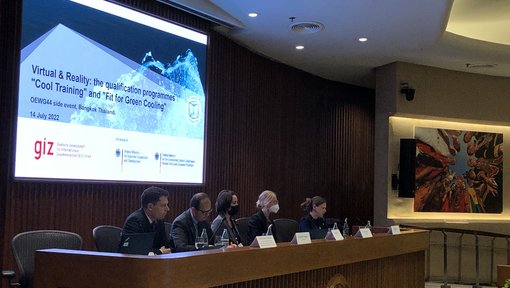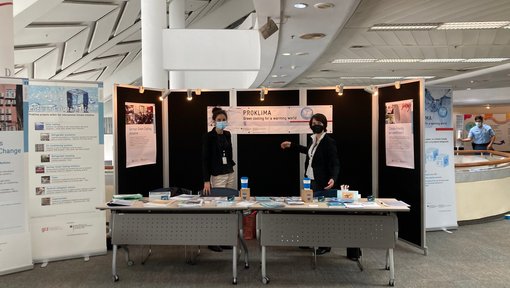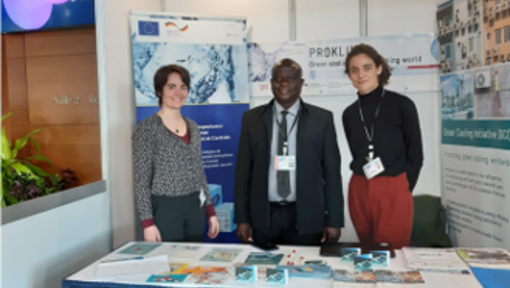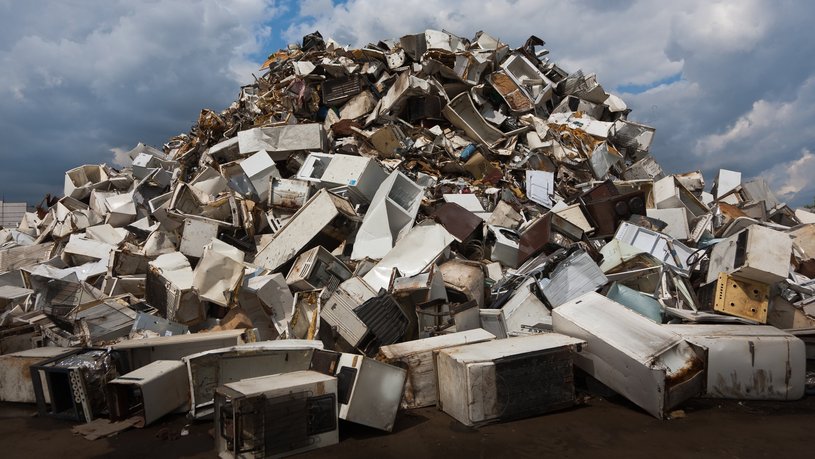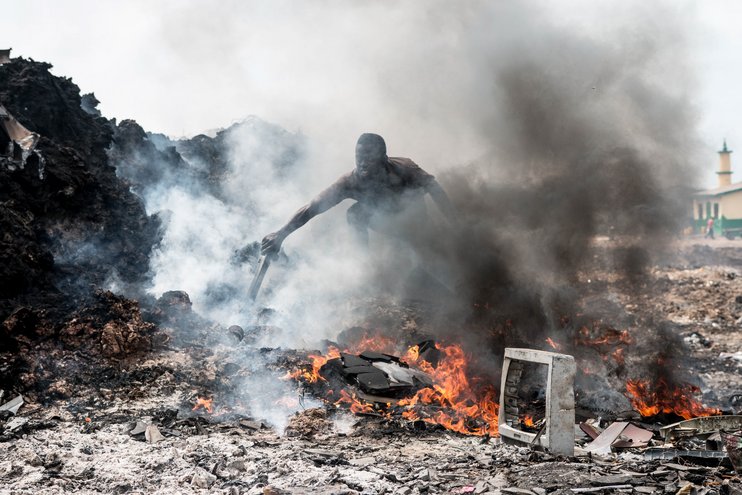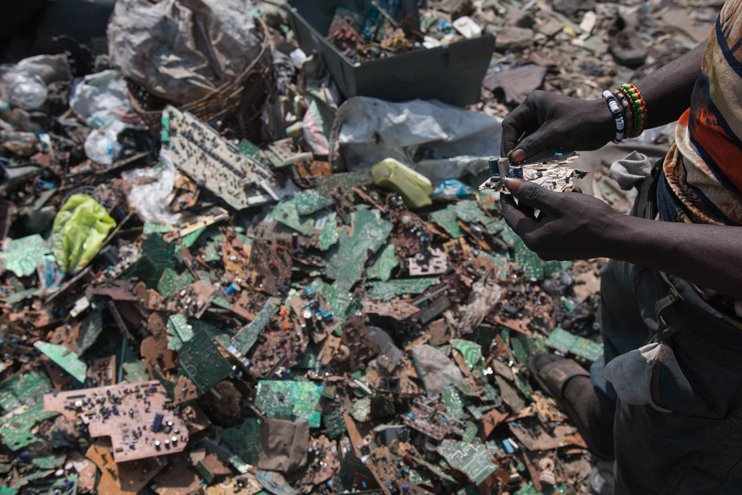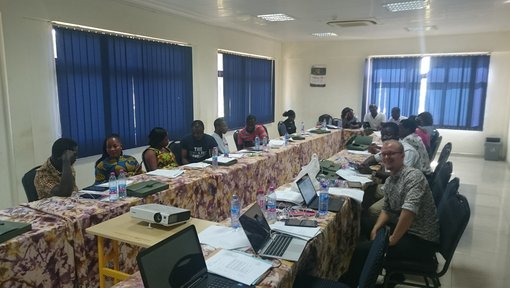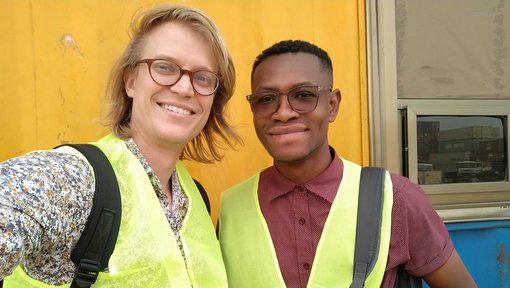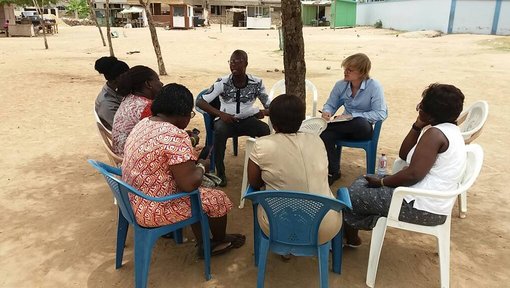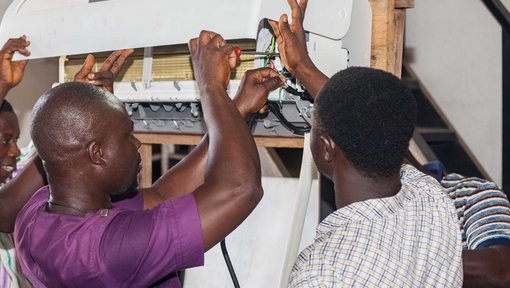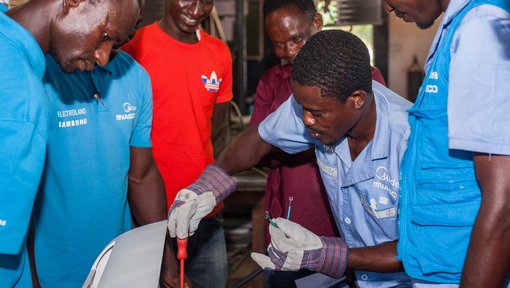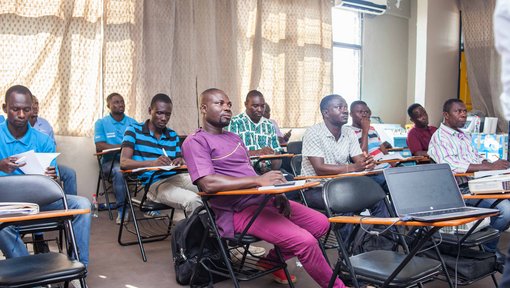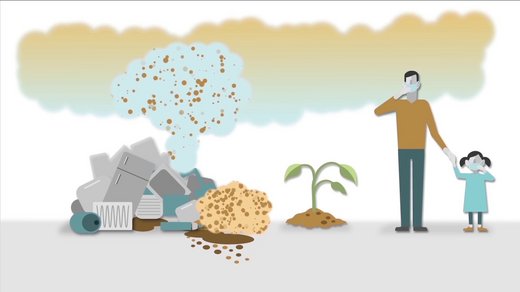Why used cooling imports are posing a risk for Ghana – and how behavioural science can help.
From 2004 – 2014, more than 3.7 million refrigerators were imported into Ghana. About 75% of them were second-hand, according to a study by Ghana's University of Energy and Natural Resources. Although the import of second-hand fridges and ACs has been banned in Ghana since 2013, they are still freely available.
This poses a substantial problem for the country: The old cooling appliances often contain ozone- and climate-damaging substances and consume lots of energy. The higher energy demand stresses the already overburdened electricity grid, means higher costs for the end user and has a negative impact on Ghana’s ability to fulfil its international treaty obligations. Not to mention the associated environmental hazards.
Quote Kofi
"The ban can only bark, not bite."
Agbogbloshie
At the end of their life-span, most old cooling appliances are not recycled properly and release harmful substances into the environment. Agbogbloshie, Ghana’s biggest dumping ground for e-waste (which includes non-functioning fridges and ACs), is considered to be one of the most toxic areas on the African continent. Common methods of waste processing for refrigerators include burning the foam insulation to extract still valuable materials such as copper. This emits toxic chemicals into the air, land and water. Low-income workers processing the e-waste, among them children, are exposed to serious health risks. A study has revealed that 80% of children living in such environment have dangerous levels of lead in their blood.
Proper dismantling of refrigerators and air conditioners
If not properly dismantled, a CFC containing domestic refrigerator will release 0.56 ODP kg and 3.6 tons CO2eq. The latter corresponds to a flight from Germany to Ghana. When refrigerators and air conditioners are subjected to proper waste management, there are various benefits: the protection of the ozone layer and climate, the prevention of releases of toxic substances polluting the ecosystem, saving (depleting) raw materials as well as economic benefits from the resale of valuable materials (e.g. copper).
GIZ Proklima published a guideline on the manual dismantling of refrigerators and air conditioners. The publication can be downloaded here. (opens in a new window)
Ban is not effective
In the short term, the low prices of used cooling equipment appear attractive – but in the long run, they come at a high cost for the health of the people processing the residues and the environment. However, many Ghanaians still prefer buying a cheaper second-hand fridge, rather than considering the lifecycle cost of ownership or the environmental impact. The market for refrigerators has therefore been dominated by used and inefficient imports for many years. The broad availability of old appliances complicates the introduction of new cooling units with higher MEPS and better energy efficiency. “The ban can only bark, not bite”, concludes Kofi A. Agyarko, head of Renewable Energy, Energy Efficiency, & Climate Change (REEECC) at the Energy Commission in Ghana.
According to him, the ban is the indispensable legal basis but the practical implementation needs to be improved. However, it is not enough to only focus on the second-hand markets and consumers in Africa. Europe, where many used devices come from, bears responsibility too. Exports of these unwanted products in their countries of origin should be completely banned – “especially in times of climate change, when no country wants to be identified as a dumping ground.”
Dumping of e-waste
Launch of a working group
Launch of a working group
In April 2020, an United Nations working group, the ‘Cool Coalition’, was established. It aims at finding ways to control the flow of old cooling appliances entering the African continent. Six African countries, with Ghana playing a leading role, have joined as well as different international organisations. GIZ is supporting the working group as a contributor. “We have to come together as a region to fight this dumping menace”, emphasizes Kofi A. Agyarko. By October 2020, approximately 3 near-term and 3 medium-term priority actions will be defined to support interested stakeholders in establishing regulations and providing guidance for their enforcement. In addition, communication campaigns for consumers will be developed in the future.
Introducing a discount scheme for used refrigerators
This is not the first time Ghana has developed a nationwide strategy to tackle the sale of inefficient, climate-damaging cooling devices. Starting in 2011, the west African country introduced a discount scheme to encourage people to replace their used refrigerators for a new one with better energy efficiency. The scheme required that consumers who turned in their old fridges were given coupons with monetary face values. The coupon face value was determined by the efficiency level of the new appliance purchased. By the end of the project in 2015, over 10,000 new and efficient fridges had replaced the old and inefficient ones, says Kofi A. Agyarko. In addition, entry ports of old cooling appliances were vigorously controlled, resulting in the confiscation of 30,000 pieces of used appliances between July 2013 and December 2015. But is a financial reward enough to trigger behavioural change?
The role of behavioural science
Research has shown that successful development programmes require supportive behaviour from their target group. It is therefore substantial to understand what drives human action and to recognize “that people are not rational agents and that providing them with financial or material incentives is often not enough to foster long-term behavioural change”, says Sascha Kuhn. He is a researcher at the German Development Institute and works in close cooperation with GIZ Proklima. During two field trips to Ghana in October 2018 and the beginning of 2020, he examined what's hindering the enforcement of the ban. In doing so, he not only looked at the external framework conditions: as he specialises in social psychology, he approached the topic from a behavioural point of view.
Field trips to Ghana
Results field trip
The underlying assumption: What a person bases their decisions and behaviour on depends not only on the knowledge of certain options and their availability but also on the social context. Humans are a social species that is more likely to show a behaviour if it is in line with existing norms that are approved by their peers. With this in mind, 876 middle income households in Ghana were surveyed in 2018 on their environmental awareness and behaviours with a focus on attitudes towards buying climate-friendly ACs instead of inefficient second-hand appliances.
- The first result: A lot of the Ghanaian participants were not aware of the negative impact of ACs on the climate. Informational campaigns about the impacts of energy use and high-GWP refrigerants should be further pushed.
- The second result: Social reasons (e.g. “fit in with your peers”, “do something good for your family and friends”) are an important factor in Ghana in the decision-making process. When designing information campaigns, the focus should not only be on climate protection and energy savings, but also on social aspects in order to increase the acceptance of new technologies. This is particularly relevant in the Ghanaian context. For comparison: The same survey was conducted in the Philippines, where environmental framing played a bigger role (“protect the environment”) than social norms.
In addition to the survey of households, various other stakeholders were interviewed in 2018 and 2020, e.g. experts, retailers of cooling appliances and technicians. This multilevel approach not only looks at consumer behaviour, but also includes the macroeconomic framework. What are consumers looking for in a cooling appliance? Are retailers talking to them about sustainability aspects? What approach could retailers help to sell more climate-friendly devices? Retailers play a big role in supporting customers with their purchase decision. Educating them on climate-friendly technology and making it available at fair prices is of utmost importance. In addition, installation, maintenance, repair and recycling require qualified and well-equipped technicians who know how to properly handle new technologies and refrigerants.
Training of RAC technicians
GIZ Proklima is actively involved in the training of RAC technicians worldwide, including Ghana. In the courses, the trainees get in-depth knowledge on new technologies and the capacity to operate and maintain cooling appliances based on natural refrigerants. Following the handing-over of 380 R290 ACs for demonstration purposes in Accra in September 2019, a training was conducted in collaboration with Midea, a world leading AC manufacturer from China, and the Ozone and Climate Change Unit of Ghana’s Environmental Protection Agency (EPA). Two experts from Midea and an expert from GIZ introduced 15 local technicians to the specificities when working with the natural refrigerant propane.
Technician training: How to safely handle R290 air conditioners?
GCF project
In addition to the trainings, GIZ Proklima is working on a multi-country project within the Green Climate Fund (GCF) to accelerate the transformation to climate-friendly and energy-efficient air conditioning in Ghana and Costa Rica. The undertaken research by Sascha Kuhn was a first step to understand the current market situation in Ghana. The GCF project will devote its efforts to transforming the single-split AC market which accounts for two thirds of the total GHG emissions in the RAC sector in developing countries. Targeted customer segments are consumers, corporate buyers and the public sector. By developing policy instruments (e.g. MEPS), implementing financial mechanisms for market stimulation (e.g. rebate schemes), the development of capacities (e.g. trainings on natural refrigerants) and introducing climate-friendly end-of-life solution for ACs (e.g. recovery and collection of HCFCs & HFC refrigerants), Ghana and Costa Rica are supported in reaching their climate targets under the Paris Agreement (NDCs) in a cost-effective and sustainable manner.
Ghana as an example
According to Kofi A. Agyarko, new devices made up 95% of Ghana's refrigerator sales in 2019. He hopes that other African countries will take Ghana as an example and introduce bans on the import of second-hand appliances as well. “To achieve this, it is important that countries that export the used, obsolete and inefficient cooling appliances to developing countries stop the current trading practice as a matter of urgency”, he concludes.
Cooling is an essential part of everyday life - it is a basic need for everyone that ensures prosperity. But climate-friendly and energy-efficient cooling solutions are necessary to protect the climate and cater to people’s vital needs. The transition of the supply side needs to go hand in hand with the demand side. Therefore, a transparent communication and information of the customer is vital. Sustainable lifestyles and new green technologies need to be made attainable, but also attractive.
Dig deeper
- GIZ (2019). eWaste Training Manual.
- Kaplan, L., Kuhn, S., Kuhnt, J. (2020). The Behavioural Lens: Taking a Behavioural Vantage Point to Improve the Success of Development Programmes. DIE Briefing paper. DOI: 10.23661/bp2.2020
- Never, B., Albert, J. R, Fuhrmann, H., Gsell, S. Jaramillo, M., Kuhn, S., Senadza ,B. (2020). Carbon Consumption Patterns of Emerging Middle Classes. DIE Discussion Paper. DOI: 10.23661/dp13.2020
- Agyarko, Opoku, van Buskirk (2019). Removing barriers and promoting demand-side energy efficiency in households in Sub-Saharan Africa: A case study in Ghana.

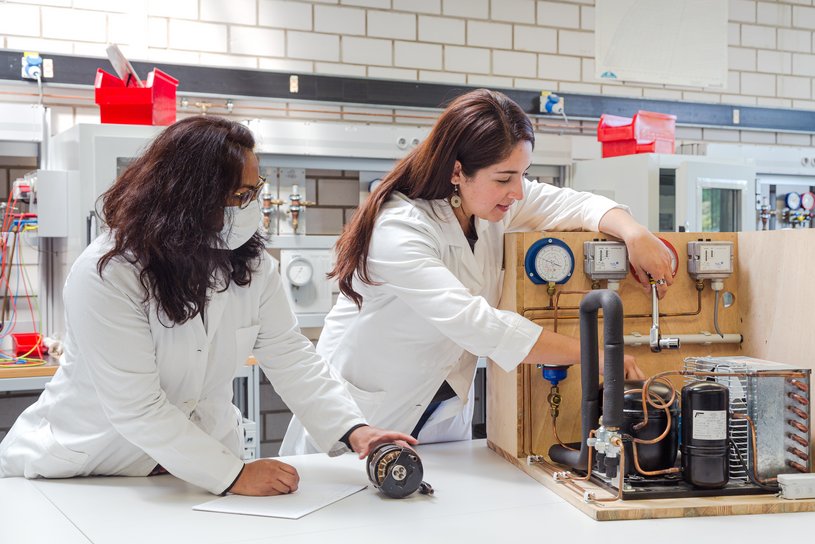 Image: giz / Andreas Döring
Image: giz / Andreas Döring